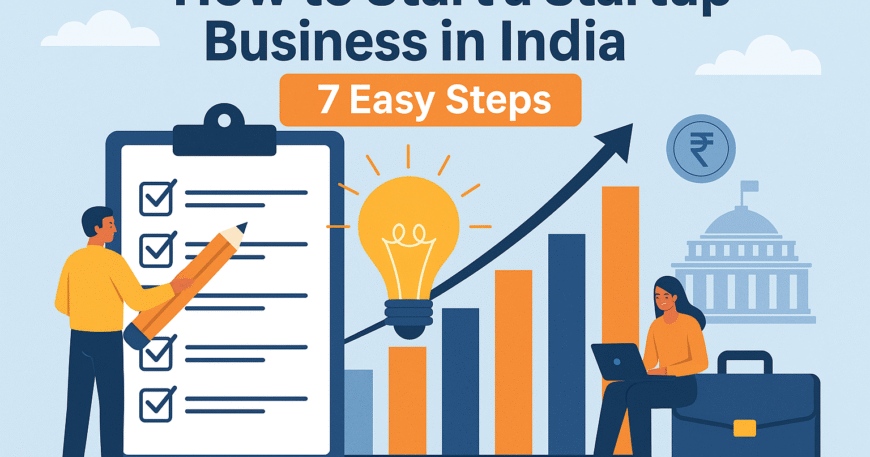How to Do Startup Business in India : 7 Easy Steps
India is not just a country—it’s a startup powerhouse. With over 100,000 recognized startups and growing, India is providing budding entrepreneurs a chance to innovate, scale, and succeed like never before. Whether you’re a student, freelancer, corporate dropout, or someone with a passion project, understanding how to do startup business in India the right way can be your launchpad to success.
This guide unpacks 7 essential steps you must follow—covering everything from ideation and registration to funding and promotion. Let’s get into it.
Explore : How to do startup business in India
1. Discover a Viable Startup Idea and Validate It
The journey of every startup begins with an idea—but not just any idea. It must solve a real-world problem or fill a gap in the market.
Table of Contents
ToggleStart With:
- Observing consumer pain points
- Using tools like Google Trends, Quora, Reddit, Ubersuggest
- Interviewing your potential customers
Validate Your Idea:
- Create an MVP (Minimum Viable Product)
- Launch a landing page to collect interest
- Ask for feedback
Example: Zomato started as a restaurant menu aggregator; it evolved based on user needs.
Not sure if your idea is startup-worthy? Book a free validation session with Solskyy-Startup Solutions today!
2. Build a Business Plan That Drives Growth
Once your idea is validated, the next big move is drafting a detailed business plan.
A Strong Business Plan Includes:
- Executive Summary
- Problem & Solution
- Target Market & Segments
- Unique Value Proposition
- Marketing Strategy
- Revenue Model
- Break-even Analysis
- Funding Requirements
- Financial Projections
Pro Tip: A clear business plan increases your chances of securing funding from banks, angel investors, or Startup India schemes.
3. Choose the Right Legal Structure
Your business structure defines taxation, compliance, ownership, and liability.
Types of Business Entities in India:
| Structure | Best For | Key Features |
|---|---|---|
| Sole Proprietorship | Solo entrepreneurs | Easy to form, full control, unlimited liability |
| Partnership Firm | Small teams, shared capital | Shared profits/losses, moderate compliance |
| LLP | Tech startups, professionals | Limited liability, flexible |
| Private Limited Company | Fundraising startups | Mandatory audits, investor-friendly |
Solskyy’s experts help you choose and register the perfect structure for your business. Talk to our legal consultants
4. Register Your Startup in India
Now comes the paperwork—but don’t worry, it’s simpler than ever with digital portals and expert help.
✍️ Registration Requirements:
- Company Name Reservation (via RUN/MCA)
- Director Identification Number (DIN)
- Digital Signature Certificate (DSC)
- Incorporation via SPICe+ on MCA Portal
- PAN, TAN, GST Registration
- Startup India DPIIT Recognition
✅ Benefits of DPIIT Registration:
- Self-certification for labor & environmental laws
- Tax exemption for 3 consecutive years
- Access to government schemes
Don’t get lost in legalities. Register your startup hassle-free with Solskyy.
5. Open a Business Bank Account & Get Compliant
A separate bank account for your startup is legally mandatory (except for sole proprietorships) and financially wise.
You’ll Also Need:
- GST Registration (if turnover > ₹20/40 lakhs)
- Shops & Establishment License
- Udyam Registration (for MSME benefits)
- EPFO/ESIC (if hiring employees)
Tip: Set reminders for compliance filing dates (GST returns, ROC, ITR).
Solskyy helps startups manage compliance, accounting, and filings , so you can focus on growth.
6. Explore Government Schemes and Startup India Funding
Many startups fail due to lack of capital—but you don’t have to.
💰 Government Schemes Include:
- Startup India Seed Fund Scheme (SISFS): Up to ₹50 lakhs for MVP & product development
- Credit Guarantee Fund Trust (CGTMSE)
- Stand-Up India
- MUDRA Loans
- SIDBI Fund of Funds
🎯 Eligibility:
- DPIIT-registered startup
- Scalable and innovative business model
- Minimum 10% equity investment from founders
🔗 Read more : Top 7 Government Startup Schemes in India (2025)
7. Market Your Startup Online with Solskyy-Digital Solutions
You’ve built the engine—now fuel it with digital marketing. Visibility drives sales.
Key Channels:
- SEO – Rank higher on Google and drive organic traffic
- Social Media – Build brand, engage, and convert
- Performance Ads –Reach potential customers with PPC campaigns
- Email Marketing – Nurture and retain leads
- Content Marketing – Blogs, videos, infographics
Want full-service digital growth support? Explore Solskyy-Digital Solutions and get started with a strategy session.
Conclusion: Start Smart, Scale Fast
Now that you’ve learned how to do startup business in India—don’t let the opportunity slip away. From validation to visibility, every step can be done right with expert help.
Solskyy is your 360° startup partner—from registration to digital marketing.
✅ Need Help?
Schedule a Free Startup Launch Consultation with Solskyy now.
🙋♂️ FAQs: How to Do Startup Business in India
Q1. Can anyone start a startup in India?
Yes! Indian citizens above 18 can start a business—alone or with partners.
Q2. What if I don’t have funding?
Start small, validate fast, and explore Startup India and MUDRA schemes.
Q3. Is it mandatory to register my startup?
Not for all cases, but registration opens doors to funding, tax benefits, and legal protection.
Q4. Can I get loans for a new startup?
Yes. Check out Startup India Loan, Stand-Up India, and CGTMSE schemes.
Q5. How much does it cost to register a startup?
Basic company registration may cost ₹3,000–₹15,000 depending on the structure and state.
Q6. Can Solskyy handle my end-to-end startup journey?
Absolutely! From business plans to digital growth, Solskyy-Startup Solutions is your one-stop partner.




